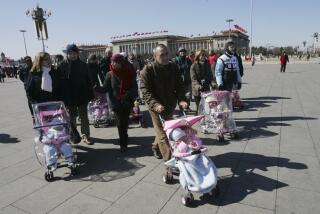China Lifts Ban on Civet Cat Sales Despite SARS Risk
- Share via
BEIJING — A ban on the sale of civet cats in China has been lifted despite the creatures’ possible link to the spread of SARS -- a sign that economic concerns are trumping medical precautions barely a season after the height of the disease.
“Starting to sell them in markets again seems to be looking for trouble,” Henry Niman, a Harvard University professor who has tracked SARS since its earliest days, said Friday.
The ban, imposed at the end of April, prohibited the hunting, transport, sale and purchase of most wild animals. It was one of the many sweeping measures China imposed to curb the spread of severe acute respiratory syndrome, which first appeared in the southern province of Guangdong in November before hop-scotching around the globe and infecting thousands.
This week’s decision, issued by China’s Forestry Administration, lifted the prohibition on sale and purchase of 54 types of wildlife -- including civet cats, which have been identified as carriers of the SARS virus -- as long as they are farm-raised.
“Wildlife breeding and trading is a healthy industry as long as we follow scientific technologies and strict administration,” a forestry spokesman who gave only his surname, Li, said Friday.
More than 900 people around the world died of SARS, most of them in Asia, before it subsided in June. In mainland China, more than 5,300 people were sickened and 349 died of the disease, with more than half of those in the capital, Beijing, the hardest-hit city in the world.
Medical investigators believe the virus jumped from animals to humans and could still be rampant among wildlife populations. Researchers have warned that the disease could reemerge when cold weather returns.
In May, the SARS virus was found in civets, mammals resembling large weasels with long, catlike bodies and large tails. They are considered a delicacy in China, and their meat is prized enough to fetch about $5 a pound -- a princely sum in a country where the average urban worker makes about $700 a year. Researchers have said that although fully cooked civet meat is probably safe, people could become infected while handling the animals during breeding, slaughter or preparation.
More to Read
Sign up for Essential California
The most important California stories and recommendations in your inbox every morning.
You may occasionally receive promotional content from the Los Angeles Times.










